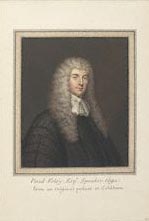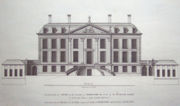.gif)
Paul Foley (ironmaster)
Encyclopedia

Thomas Foley (1616-1677)
Thomas Foley was the eldest son of the second marriage of Richard Foley , a prominent Midlands ironmaster. He took over his father's business and made great profits from it in the 1650s and 1660s, which he used to buy estates. He then handed his business over to his sons, another Thomas Foley,...
of Witley Court
Witley Court
Witley Court in Worcestershire, England is a Grade 1 listed building and was once one of the great houses of the Midlands, but today it is a spectacular ruin after being devastated by fire in 1937. It was built by Thomas Foley in 1655 on the site of a former manor house near Great Witley...
, the prominent Midlands
West Midlands (region)
The West Midlands is an official region of England, covering the western half of the area traditionally known as the Midlands. It contains the second most populous British city, Birmingham, and the larger West Midlands conurbation, which includes the city of Wolverhampton and large towns of Dudley,...
ironmaster
Ironmaster
An ironmaster is the manager – and usually owner – of a forge or blast furnace for the processing of iron. It is a term mainly associated with the period of the Industrial Revolution, especially in Great Britain....
.
Ironmaster
He took over his father's ironworksIronworks
An ironworks or iron works is a building or site where iron is smelted and where heavy iron and/or steel products are made. The term is both singular and plural, i.e...
in and around the Forest of Dean
Forest of Dean
The Forest of Dean is a geographical, historical and cultural region in the western part of the county of Gloucestershire, England. The forest is a roughly triangular plateau bounded by the River Wye to the west and north, the River Severn to the south, and the City of Gloucester to the east.The...
in the early 1670s and continued them until 1685 when he let them to John Wheeler and Richard Avenant, who had managed ironworks for his brother Philip Foley
Philip Foley
Philip Foley was the youngest of the three surviving sons of the British ironmaster Thomas Foley . His father transferred to him in 1668 and 1669 all his ironworks in the Midlands for £60,000...
. In 1692, the two brothers entered into a partnership with these managers and John Wheeler's brother, Richard. This lasted until after Paul's death.
Gentleman

Stoke Edith
Stoke Edith is a village in the English county of Herefordshire, situated on a road leading from Hereford to Ledbury. The manor belonged formerly to the Wallwynes, Milwaters and Lingen families....
in Herefordshire
Herefordshire
Herefordshire is a historic and ceremonial county in the West Midlands region of England. For Eurostat purposes it is a NUTS 3 region and is one of three counties that comprise the "Herefordshire, Worcestershire and Gloucestershire" NUTS 2 region. It also forms a unitary district known as the...
, part of which still belongs to a descendant. Important purchases included Stoke Edith from the trustees of Sir Henry Lingen
Henry Lingen
Sir Henry Lingen , Lord of Sutton, Lingen and Stoke Edith, was a Royalist military commander in Herefordshire during the English Civil War, and later a Member of Parliament.-Ancestry:...
in 1670 (made by his father), and other property from Sir Thomas Cooke in 1683. He rebuilt the house at Stoke Edith and laid out formal gardens and a park (which he had a royal licence to empark.
Politician
Paul Foley was elected M.P. for HerefordHereford (UK Parliament constituency)
Hereford was, until 2010, a constituency of the House of Commons of the Parliament of the United Kingdom. Since 1918, it had elected one Member of Parliament by the first-past-the-post voting system....
in 1679. He was elected again for the same seat in 1689. He actively campaigned for the exclusion of the Duke of York
James II of England
James II & VII was King of England and King of Ireland as James II and King of Scotland as James VII, from 6 February 1685. He was the last Catholic monarch to reign over the Kingdoms of England, Scotland, and Ireland...
from the throne. He was imprisoned at the time of the Rye House Plot
Rye House Plot
The Rye House Plot of 1683 was a plan to assassinate King Charles II of England and his brother James, Duke of York. Historians vary in their assessment of the degree to which details of the conspiracy were finalized....
and again during the Monmouth Rebellion
Monmouth Rebellion
The Monmouth Rebellion,The Revolt of the West or The West Country rebellion of 1685, was an attempt to overthrow James II, who had become King of England, King of Scots and King of Ireland at the death of his elder brother Charles II on 6 February 1685. James II was a Roman Catholic, and some...
. However, James II later favoured him during his own later difficulties. During the reign of William III
William III of England
William III & II was a sovereign Prince of Orange of the House of Orange-Nassau by birth. From 1672 he governed as Stadtholder William III of Orange over Holland, Zeeland, Utrecht, Guelders, and Overijssel of the Dutch Republic. From 1689 he reigned as William III over England and Ireland...
took an anti-court position, establishing Country Whigs
British Whig Party
The Whigs were a party in the Parliament of England, Parliament of Great Britain, and Parliament of the United Kingdom, who contested power with the rival Tories from the 1680s to the 1850s. The Whigs' origin lay in constitutional monarchism and opposition to absolute rule...
with his nephew Robert Harley
Robert Harley, 1st Earl of Oxford and Mortimer
Robert Harley, 1st Earl of Oxford and Earl Mortimer KG was a British politician and statesman of the late Stuart and early Georgian periods. He began his career as a Whig, before defecting to a new Tory Ministry. Between 1711 and 1714 he served as First Lord of the Treasury, effectively Queen...
. During the early 1690s, he sat on several important Parliamentary committees, including being a commissioner of accounts. He was elected Speaker of the House of Commons
Speaker of the British House of Commons
The Speaker of the House of Commons is the presiding officer of the House of Commons, the United Kingdom's lower chamber of Parliament. The current Speaker is John Bercow, who was elected on 22 June 2009, following the resignation of Michael Martin...
in 1695, a post he held until his death. He was (like the Harleys and his elder brother Thomas
Thomas Foley (c. 1641–1701)
Thomas Foley was the eldest son of the ironmaster Thomas Foley. He succeeded his father to the Great Witley estate, including Witley Court, in 1677....
) a Presbyterian and used his patronage rights
Advowson
Advowson is the right in English law of a patron to present or appoint a nominee to a vacant ecclesiastical benefice or church living, a process known as presentation. In effect this means the right to nominate a person to hold a church office in a parish...
in the church
Church of England
The Church of England is the officially established Christian church in England and the Mother Church of the worldwide Anglican Communion. The church considers itself within the tradition of Western Christianity and dates its formal establishment principally to the mission to England by St...
to appoint clergy of that persuasion to churches.
Family
He married Mary daughter of Alderman John Lane of London. Their eldest son was Thomas FoleyThomas Foley (auditor of the imprests)
Thomas Foley held the sinecure office of auditor of the imprests. He was the eldest son of Paul Foley, Speaker of the House of Commons and ironmaster, and succeeded to his estates around Stoke Edith, Herefordshire on his father's death in 1699.Thomas Foley was Member of Parliament for Hereford...
. His younger son Paul
Paul Foley (politician)
Paul Foley was an English barrister and politician, the second son of Paul Foley, sometime Speaker of the House of Commons.Admitted to Lincoln's Inn, he was a member of Parliament for Aldborough from 1713 to 1715...
, was also briefly an MP.

